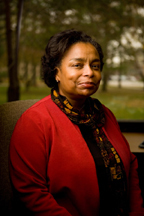
University of Notre Dame political scientist Dianne Pinderhughes wants the upcoming presidential election to accomplish one specific outcome, and it doesn’t have anything to do with gender or race.
“I want the society to be better than it’s been for the last eight years,” said the acting chair of Notre Dame’s Department of Africana Studies. "Ever since 2000, with that Florida election that was so contested, the values we’re used to have been turned upside down.
“We’ve lost any sense of right and wrong. I have the sense that the country has lost its anchor. I’d like to think we can get back to somewhere where there’s moral stability. I think it’s still going to be hard,” she said.
Chatting about the election over a recent lunch, Pinderhughes expressed sympathy for an American public trying to negotiate the task of choosing a candidate.
“There’s this tremendous swirl of stuff to sort through all the time,” she said. “You’ve got race. You’ve got gender. It’s hard to work through the layers of implications.”
During the primaries, Pinderhughes was quoted as saying, “I’m not from Missouri, but you have to ‘show me’ that white people will vote for Obama.”
Well, the primaries showed her white people do vote for a black candidate. A scholar who has focused on the issue of race in elections, she says, “I wouldn’t have thought that, and most prior research didn’t show much evidence along those lines.”
If Barack Obama is elected, Pinderhughes reflects, she’s still not going to be certain that barriers have been lifted for black politicians, because Obama and John McCain both are such exceptional cases.
“The interesting thing about Obama is whenever he runs for office, he always runs against someone whose candidacy disintegrates,” she says. “He always seems to be able to run when the opposing party is not doing well.”
Even though we don’t know who will win the election, the process has left a number of legacies. Among them, it has revealed a point about African-Americans that the public had not yet grasped: Not all African-Americans think or act the same way.
“Because of the comprehensiveness of racial discrimination, people are more likely to vote for the same party or same candidate within that cohort,” Pinderhughes said. “But with the African-American group, there’s a lot of significant disagreement on social issues, on the death penalty, on religion. There are a considerable number of black conservatives. But because of race, they get pulled in a different way.”
Somewhat cloudier is the meaning of gender in the political discourse.
“People use the term ‘sexism’ for manipulative purposes,” Pinderhughes asserts. “In the selection of Sarah Palin, any criticism against her became sexism. That’s preposterous. One should be able to comment about the ability of a candidate to run for office without being accused of sexism.”
Pinderhughes’ advice for the still-undecided: “Ask yourself how you judge leadership. Try to be deliberate about it. Do some comparisons. Find some way to look at the whole personality … What moves or drives the candidates? What personal resources are they likely to draw upon? And ask yourself: Do you like those things?”
Having recently stepped down as president of the American Political Science Association, she is hoping political scientists in higher educational institutions and high school civics teachers have prepared the public well enough to make such thoughtful choices.
Or, she wonders, “maybe we didn’t succeed.”
Contact: Dianne Pinderhughes, pinderhughes.1@nd.edu
Originally published by at newsinfo.nd.edu on October 23, 2008.